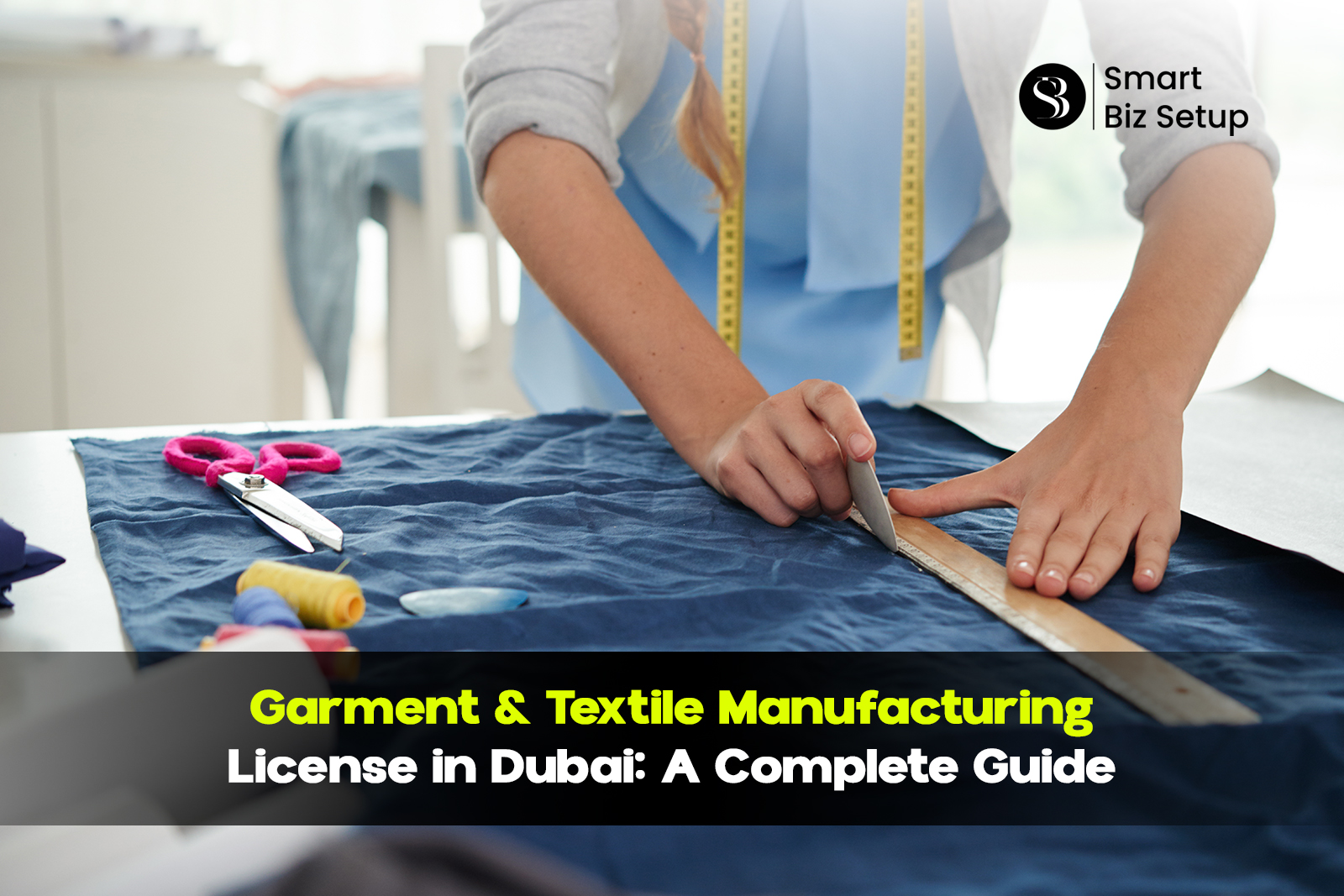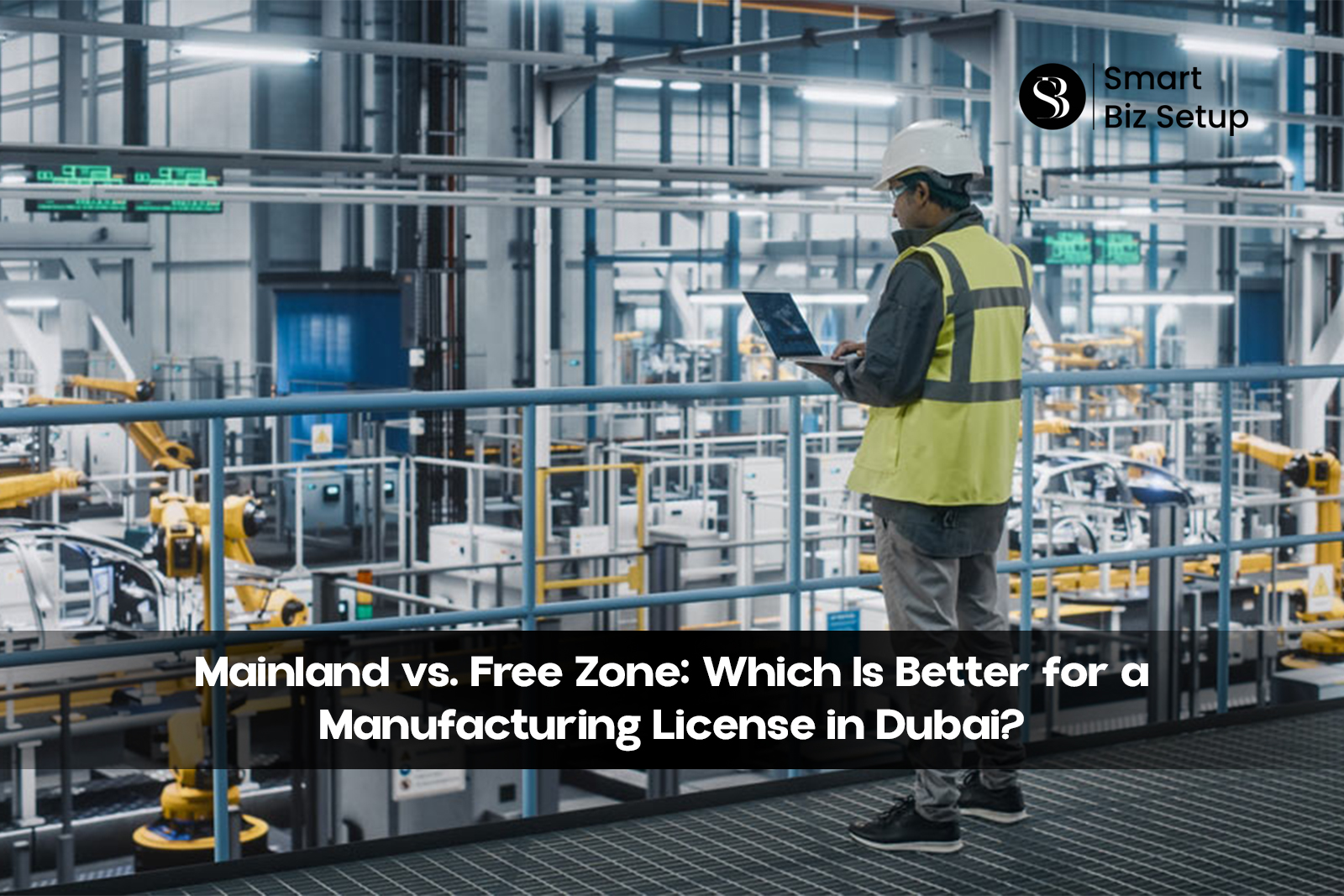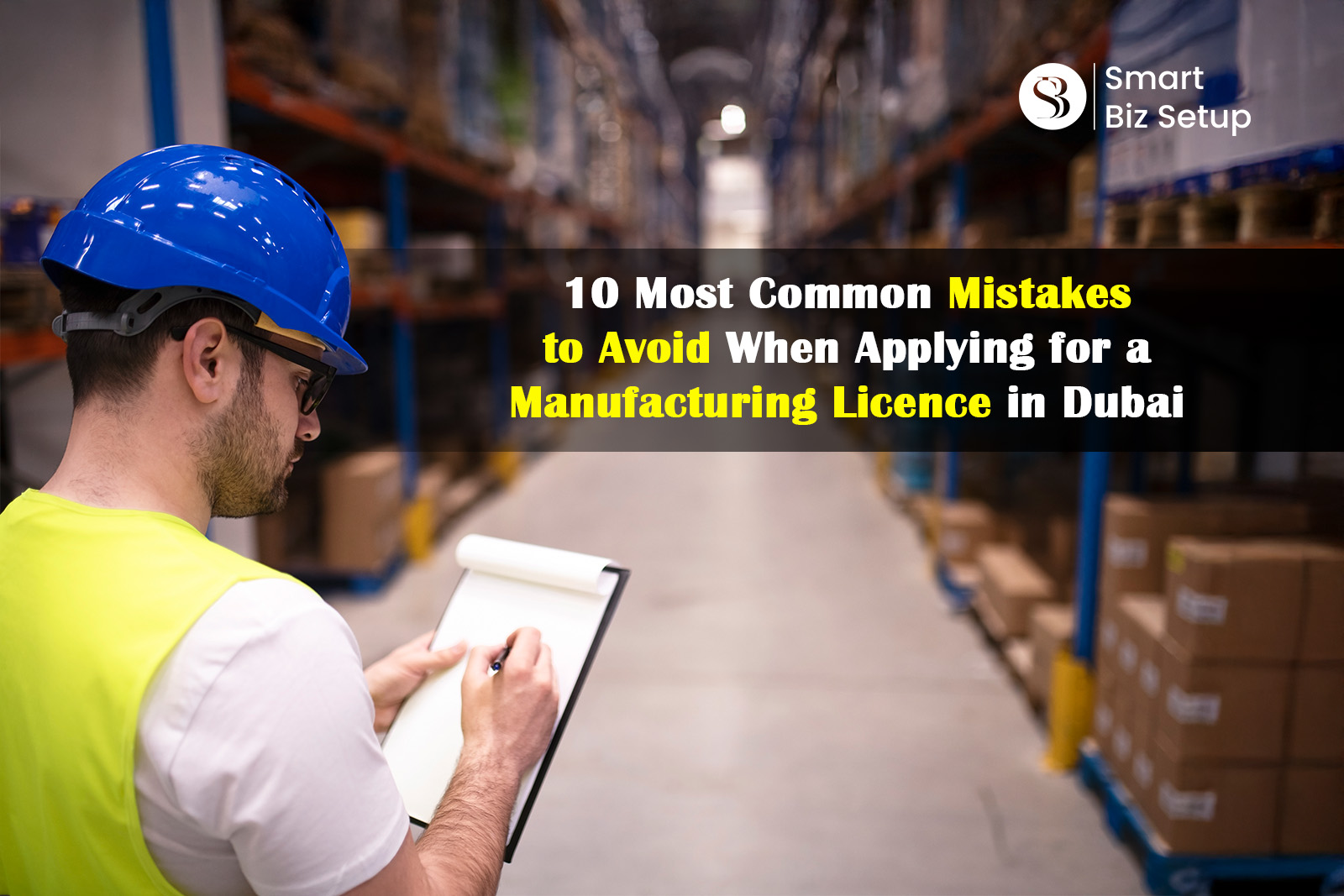Setting up a manufacturing business in Dubai can be highly rewarding, but navigating the licensing process can also be challenging if you’re not well-prepared. Whether you’re launching a large-scale facility or a small business, securing a manufacturing licence in Dubai involves specific requirements, approvals, and documentation.
To help you avoid costly delays and legal pitfalls, here’s a detailed look at the 10 most common mistakes applicants make when applying for a manufacturing licence in Dubai, and how to avoid them.
What is a Manufacturing License in Dubai?
A manufacturing license in Dubai is an official permit issued by the UAE government, either through the Department of Economic Development (DED) or a Free Zone Authority, that allows a business to legally produce, assemble, fabricate, or process goods within the country.
What Does a Manufacturing License in Dubai Cover?
If you are wondering what will be covered if you get a manufacturing license in Dubai, below is an explanation of what it covers.
- Setting up factories, industrial units, or production facilities.
- Activities include packaging, assembling, fabricating, and processing raw materials.
- Manufacturing across various sectors, including food & beverage, textiles, plastics, electronics, construction materials, and more.
Mistakes To Avoid When Applying for a Manufacturing License in Dubai
Now, when applying for a manufacturing license in Dubai, mistakes can cost you time and money. Understanding where you can go wrong beforehand can save you from committing mistakes that can bottleneck your company’s growth.
1. Choosing the Wrong Jurisdiction
One of the most critical decisions is whether to set up in a Free Zone or on the mainland. Each has its own regulations, benefits, and limitations:
- Dubai mainland offers access to the local UAE market but may require a local sponsor in some business activities.
- Free Zones allow 100% foreign ownership and have their own licensing authorities.
Mistake: Many investors choose a jurisdiction based solely on setup cost or ownership perks without fully considering operational needs, access to suppliers, market reach, logistics, and compliance with industrial activity requirements. For example, setting up a heavy manufacturing unit in a Free Zone that doesn’t support large-scale utilities or permits for certain raw materials can result in costly delays or relocation.
Solution: Align your manufacturing objectives, product type, scale, and target market with the benefits and constraints of each jurisdiction. Always consult a licensed business setup expert or legal advisor to conduct a feasibility assessment before making your final decision.
2. Not Understanding the Licensing Authority Requirements
Dubai has multiple regulators for issuing industrial and manufacturing licences. For example:
- Dubai DED (Department of Economic Development) handles mainland licences.
- Free Zone Authorities handle licences within their zones.
- Dubai Municipality and Dubai Civil Defence may also be involved in facility inspections.
Mistake: A common mistake is applying for a licence through the wrong authority, submitting incomplete documentation, or overlooking secondary approvals. Entrepreneurs often underestimate the complexity of compliance and assume a single authority handles everything. This can lead to application rejection, delays, or fines.
Solution: Conduct thorough research to determine which regulatory body governs your intended business location, and understand the full list of their compliance requirements. This includes approvals for machinery, site zoning, environmental impact, and fire safety. Consulting with a business advisor familiar with Dubai’s manufacturing ecosystem can help avoid these administrative pitfalls.
3. Incomplete or Incorrect Documentation
Even minor errors in your documents can cause major delays in the approval process.
Mistakes:
- Missing or expired passport copies of shareholders or directors.
- Incorrect tenancy contracts that do not align with the industrial activity.
- Incomplete feasibility studies that fail to address operational, financial, or environmental aspects.
- Lack of required attestations or failure to submit translated versions in Arabic.
These errors not only delay your application but may also increase costs due to resubmission fees or the need to restart the approval process.
Solution: Prepare a comprehensive and updated document checklist in advance. Double-check that all paperwork is signed, stamped, and, where required, legally attested and translated into Arabic. It’s highly recommended to consult a professional PRO service or a business setup expert familiar with manufacturing license documentation in Dubai.
4. Underestimating the Approval Timeline
The manufacturing licence timeline in the UAE can vary depending on the activity, location, and business size. It may take 3–6 weeks or more for final approvals.
Mistake: Many applicants assume that licences are issued within a few days and begin committing to production contracts, hiring staff, or purchasing machinery before the licence is approved. This often results in missed deadlines, penalties, and wasted resources.
The truth is: It can take anywhere from 3 to 6 weeks, or even longer, especially if additional technical or environmental approvals are needed.
Solution: Always plan your operational and launch timelines with a realistic buffer. Build in time for inspections, document revisions, authority feedback, and unexpected delays. Communicating this timeline clearly with partners and suppliers can prevent misunderstandings and protect your business’s credibility.
5. Not Budgeting for Hidden Costs
Besides the basic fees, there are additional costs you must consider:
- Civil Defence approvals
- Environmental permits
- Warehouse fit-outs
Mistake: Focusing only on the headline cost of the licence while ignoring additional expenses like:
- Civil Defence and safety system approvals
- Environmental permits and waste disposal systems
- Warehouse or factory facility fit-outs (fire safety, insulation, equipment setup)
- Visa allocations and employee insurance
- Translation and legal attestation fees
This lack of financial foresight can cause delays, debt, or a sudden need to inject more capital than originally planned.
Solution: Before applying, request a comprehensive cost estimate that includes all licensing, approval, facility, visa, and renewal expenses. Also, prepare a financial buffer for unexpected costs. This will give you a clearer ROI outlook and ensure smoother business execution without financial shocks.
6. Failing to Align the Business Activity with Actual Operations
The business activity on your licence must precisely match what you plan to manufacture.
Mistake: Selecting a general activity like “industrial products manufacturing” without specifying your niche. This misalignment may lead to penalties during inspections or even the need to apply for a new licence later. It can also prevent you from obtaining necessary approvals from other regulatory bodies linked to specific industries (e.g., food, chemicals, electronics).
Solution: Use the official activity list from DED or the relevant Free Zone authority and pick the most accurate classification. If your business deals with multiple products, list all relevant sub-activities to avoid limitations in the future. It’s wise to consult licensing experts before finalising your activity description.
7. Overlooking Health, Safety & Environmental Compliance
Industrial operations are closely monitored for environmental impact, fire safety, and occupational hazards.
Mistake: Many applicants underestimate how strict Dubai’s regulatory bodies are regarding compliance. Ignoring or postponing approvals from entities like Dubai Civil Defence, Dubai Municipality, or the Ministry of Climate Change and Environment can delay your licence or even result in rejection. For example, a lack of proper ventilation, storage protocols for hazardous materials, or fire prevention measures can lead to serious penalties or shutdowns.
Solution: Prepare your factory layout and operational plans in line with the UAE’s industrial compliance regulations from day one. Hire a certified consultant if needed to ensure your facility meets all HSE (Health, Safety & Environment) standards before applying for inspections.
8. Ignoring Visa Planning for Staff
Once your licence is approved, you’ll need to sponsor employees under your company.
Mistake: Many manufacturing business owners jump into operations without evaluating their visa needs early on. They often assume visas can be processed anytime or in unlimited quantities. However, Free Zones and mainland jurisdictions have specific visa quotas based on your facility’s size (especially warehouse square footage), nature of activity, and company structure. If your setup doesn’t meet the required standards (like labour accommodation or office space), your visa applications may be delayed or rejected. Not aligning the number of employees with what your licence allows can also restrict scaling.
Solution: Estimate your workforce requirements from the beginning. Check the visa eligibility criteria for each staff category, skilled, unskilled, and technical, and ensure your premises meet the relevant specifications. Factor in any labour housing obligations or third-party PRO services if needed. Always consult with your zone authority or a professional consultant to avoid disruptions.
9. Trying to Renew Without Meeting Prerequisites
Manufacturing licences need to be renewed annually, and the renewal requires:
- Updated lease contracts
- Proof of active operations
- Audit reports (in some cases)
Mistake: Many businesses assume licence renewal is a simple online process and leave it until the last minute. For example, an expired lease contract or missing proof of operations (like utility bills or staff visas) can delay the process or even cause penalties. In Free Zones, non-compliance may also freeze your portal access or affect your ability to apply for visas or bank facilities. In severe cases, the licence may lapse, triggering fines or even blacklisting.
Solution: Maintain organised records and plan your manufacturing licence renewal in Dubai at least a month in advance. Stay ahead by maintaining a centralised record system and setting renewal reminders. Begin the renewal process 30–45 days in advance, ensuring all documents are valid, signed, and submitted on time.
10. DIY Approach Without a Professional Agent
The manufacturing licence application in Dubai can be complex, especially for first-timers.
Mistake: Many entrepreneurs take the do-it-yourself route, thinking they can save costs, only to face avoidable delays, rejections, or compliance penalties. They often misinterpret regulatory language, apply it to the wrong authority, or miss crucial permits from bodies like Dubai Municipality, Civil Defence, or the Ministry of Industry and Advanced Technology. In industrial setups, even layout approvals and environmental clearances involve technical knowledge and back-and-forth communication, which can be overwhelming without local experience.
Some also underestimate the importance of Arabic translations, attested documents, or timeline coordination between departments, leading to repeat submissions, rescheduled inspections, or extra fees.
Solution: Hire a professional agent or business consultant with manufacturing setup experience to streamline the process. A good agent will ensure your application is aligned with legal and zoning requirements, guide you on approvals, and help avoid costly missteps, saving you time, effort, and reputation.
Final Thoughts
Getting a Dubai manufacturing license is a critical first step in setting up your industrial business. Avoiding these common mistakes can save you time, money, and stress. Whether you’re applying for a Dubai DED industrial licence, a Free Zone industrial permit, or setting up a small-scale facility, due diligence is essential.
For a smooth experience, follow a step-by-step guide to apply for a manufacturing licence in Dubai, work with experts, and always stay updated on regulatory changes.
Need Help Setting Up Your Manufacturing Business in Dubai?
We assist with end-to-end solutions, from documentation to regulatory approvals. Contact us for a free consultation and get your licence without the usual delays.
Ready to start? Let’s get your manufacturing licence approved the right way.
FAQs
1. What is a manufacturing (industrial) license, and who needs it in Dubai?
A manufacturing license, also known as an industrial license, legally permits a company to produce, assemble, fabricate, or process goods in Dubai. If your business involves making or modifying physical products (including food, textiles, machinery, or electronic items), you must obtain this license before starting operations. Whether you’re setting up in a Dubai free zone or on the mainland, having the correct license is essential for legal compliance and facility setup.
2. What authorities issue manufacturing licenses in Dubai, and how does jurisdiction affect my setup?
Manufacturing licenses on the mainland are issued by the Department of Economy and Tourism (DET), with federal oversight from the Ministry of Industry and Advanced Technology (MoIAT). In free zones, respective authorities issue the license. Your choice between mainland company formation and free zone setup affects factors like 100% ownership, access to the UAE market, import/export logistics, and manufacturing license cost in Dubai due to different fee structures.
3. What are the key steps to obtain a manufacturing license in Dubai?
The general process includes:
- Deciding on your manufacturing activity and business location (mainland or Dubai free zone).
- Preparing a business plan and required documents (passport copies, lease agreement, etc.).
- Registering your trade name and legal structure.
- Submitting your application, obtaining initial and sector-specific approvals (e.g., Dubai Municipality, Civil Defence).
- Building out your facility and passing inspection.
- Receiving your industrial operating license in Dubai and starting operations.
This process may slightly vary depending on your business type and chosen jurisdiction.
4. What are the minimum requirements for getting a manufacturing license in Dubai?
You must have:
- Approved industrial premises in Dubai (no virtual offices allowed).
- A detailed business plan and proof of capital.
- Environmental, health, and safety compliance (facility layout, fire prevention, and waste management plans).
- Approval from Dubai Municipality and other relevant authorities, if required by your activity.
Proper facility planning is critical for a smooth industrial business setup in the UAE.
5. How long does it take to secure a manufacturing license in Dubai?
Obtaining a manufacturing license in Dubai typically takes between 3–6 weeks, or sometimes longer if your operation requires extra technical, environmental, or safety approvals. Free zone company setup timelines may differ slightly, depending on the authority and facility readiness. Planning for possible delays is important, especially if your launch is tied to contracts or seasonal demand.
6. Do I need additional permits or approvals beyond the manufacturing license?
Yes, depending on your business activity, you may need approvals from Dubai Municipality, Civil Defence, the environment, or sector-specific authorities, especially if manufacturing food, chemicals, or regulated goods. These clearances are often mandatory for final license issuance and compliance with UAE industrial regulations. Getting the right permits also helps ensure a smooth visa application and facility inspections.
7. What are the common mistakes that delay the manufacturing license process in Dubai?
Typical pitfalls include:
- Choosing the wrong jurisdiction for an industrial business.
- Incomplete or inaccurately submitted documents.
- Underestimating required compliance and safety standards.
- Not budgeting for extra costs (fit-outs, permits, insurance).
- Applying for business activities that don’t fully match planned operations.
Being proactive and consulting with a professional advisor can help you avoid these setbacks. It also ensures your Dubai industrial license aligns perfectly with your actual operations, speeding up the approval process. Disclaimer: The information provided in this blog is for general informational purposes only and is based on publicly available sources and prevailing regulations as of 2025. Licensing requirements, laws, costs, and procedures in Dubai and the UAE may change over time and may vary depending on the specific business activity, jurisdiction, or regulatory updates. Always consult with a qualified business setup advisor or relevant government authority before making any business or legal decisions.








